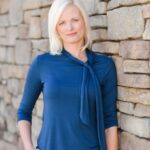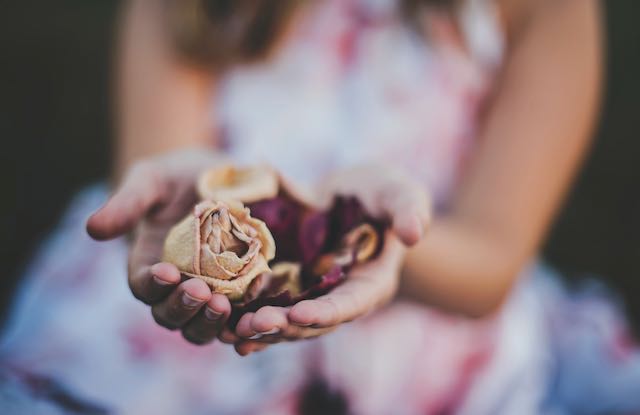I became a mother when Riley was born. I became a poet when he died. His death and writing poetry are intertwined like the malformed vessels of his AVM and his brain—rooted, inseparable as a banyan and its host tree. If Riley hadn’t died, I would not be writing poetry. I wouldn’t have survived the tsunami of his death without that lifeline.
In the hospital, when we were given the news that Riley would not survive his third bleed, a nurse whispered in my ear. I don’t remember what she looked like, but I remember her ethereal embrace and the way she placed my hair behind my ear and whispered, “You’ve been given a gift.”
I didn’t know what she meant, but I clung to her buoyant words amongst the wreckage—catastrophic, devastating, brain dead.
“It might be time to cash in your chips,” the surgeon with scuffed cowboy boots and a worn face told us after looking at Riley’s MRI, with the massive blood clot that had blown out the part of his brain responsible for speech (the ability to talk or understand language) and the part responsible for motor skills. Half of his brain had been pushed over to the other side to make room for the pressure of the blood, mirroring a process in me that felt equally physical—a knowing as clear as the MRI— that he was no longer in his body, and crushing grief forcing me out of mine, like water replacing air in a breached ship.
Dead child world is a place I wish I never entered, but it’s where I live now. My poems are warm air blowing on my face like a whisper, sunset’s orange afterglow on the water like a celestial mirror, bubbles rising in a glass of champagne like helium balloons set free, for the joy of watching their ascent.
I’m still unsure what the nurse meant. Maybe it was a response she learned in a grief training workshop, a belief that helped her with her own mourning. She could have meant the clarity I’ve had since Riley died or my heightened appreciation for life. Or maybe, she meant if the bleed had been less severe, Riley could have lived but suffered excruciating pain and debilitation.
“Does it get better?” a woman asked during the Q & A at a poetry reading. She had recently lost her twenty-three-year-old son to a drug overdose. “Do you ever feel like writing poems about your dead son just keeps dredging up the loss and pain? Do you write poems about getting through it?”
I was reading at an event with two other women who had also lost children. We each gave a brief introduction about our loss and how writing had helped us heal. Then we read our poems in a round-robin style.
I remember looking around the church at the unfamiliar faces, heads leaning in, awaiting my answer. The woman wore no make-up, and a face baring ponytail, naked to stares, to the glare of a reality she never imagined. The same look of pain on her face that I saw on mine in the mirror soon after Riley’s death. It startled me the first time—the cemented, shell-shocked expression. The woman reminded me of the way I felt the first months following Riley’s death—the desperation to pull myself out of a vortex, like the way I felt giving birth, looking for something to hold onto, something to save me from suffering I never imagined.
I answered that it does get better. That writing poetry had saved me, and mumbled some other words that probably didn’t make sense. I wanted to buoy into the turbulent waters of her grief and save her. I didn’t want her to experience the pain I have endured.
I felt inept and fraudulent. I was performing a reading, titled, “Writing Healing Poetry,” and the truth was, I didn’t completely understand why and how it helped me survive my grief. I didn’t know how to guide her. Sometimes, the aftermath of writing my poems and reading them is brutal, raw. Reading other people’s writings about their losses, though painful, helped me to feel less alone. Maybe this isn’t true for everyone.
Her question stayed with me. On the drive home from the reading with my friend, Alexis, one of the women who had read with me, we talked about it. I met Alexis in Jack Grapes’ writing class. She was there when I returned to class and told the group that Riley had died. She shared the loss of her son, Josh, to a rare cancer. She was the first person I met after Riley died who had also lost a child. We went to lunch and became close.
We talked about how it was such a loaded question. How saying, yes, may infer that you are over it, and have recovered. We talked about how the grief is always there, like the location of a past accident you drive by daily, but you learn to manage it. You learn to stop yourself, as she says, from going to that bad place in your brain.
Two years later, I tell the woman at the reading that writing about my dead son is painful, but in a way that builds strength and breaks apart scar tissue—the raw feeling after writing like sore muscles from exercise. Ultimately, I feel stronger and notice my mood elevates, but I pace myself and engage in self-care after. I go for a walk outside, watch a funny movie. I take my son, Desmond, to his favorite restaurant. When they ask, “Are you celebrating anything tonight?” We say, “Life.”
I face Riley’s death when I write. I see its facets in new light. I chisel it into bas-relief. I reframe it. I write through the ever-changing loss.
It doesn’t dredge it all up again, because the hole is always there instead of Riley, and the grief grows and ages instead of him. I watch Desmond change and age past his older brother. I watch him learn to navigate the loss—who to tell at school and how to tell a friend he has over for a play date. I see the shock on his friend’s face, and the sadness spread across Desmond’s. When he asks me en route to school, to tell him again what an AVM is, I know why he thinks understanding the science will change the chemistry of his grief, and others’ understanding.
I’ve met people who have experienced loss but say they could never write. I think everyone can benefit from the healing benefits of writing, but I get that it’s not everyone’s best fit. I know women who have started grief support groups, created foundations, published a son’s children’s book postmortem, and traveled to read it to children in hospitals battling cancer. I know women (including myself) who have tried to have another baby soon after the loss, despite a therapist’s trained response, “It’s too soon to think about it.”
Maybe the gift the nurse intimated is creation after death—the new friends, experiences, and talents we wouldn’t have had without the loss. The essence of the departed loved one’s soul-inspiring us, thriving in us. She could have meant my rebirth when Riley died; the old me wiped away, a clean slate, his death a mirror I keep looking into, to see who I am, and poetry the light.
 Chanel Brenner is the author of Vanilla Milk: a memoir told in poems, which was a finalist for the 2016 Independent Book Awards and honorable mention in the 2014 Eric Hoffer awards. Her work has appeared in New Ohio Review, Poet Lore, Rattle, Modern Loss, Salamander, Spoon River, and others.
Chanel Brenner is the author of Vanilla Milk: a memoir told in poems, which was a finalist for the 2016 Independent Book Awards and honorable mention in the 2014 Eric Hoffer awards. Her work has appeared in New Ohio Review, Poet Lore, Rattle, Modern Loss, Salamander, Spoon River, and others.


